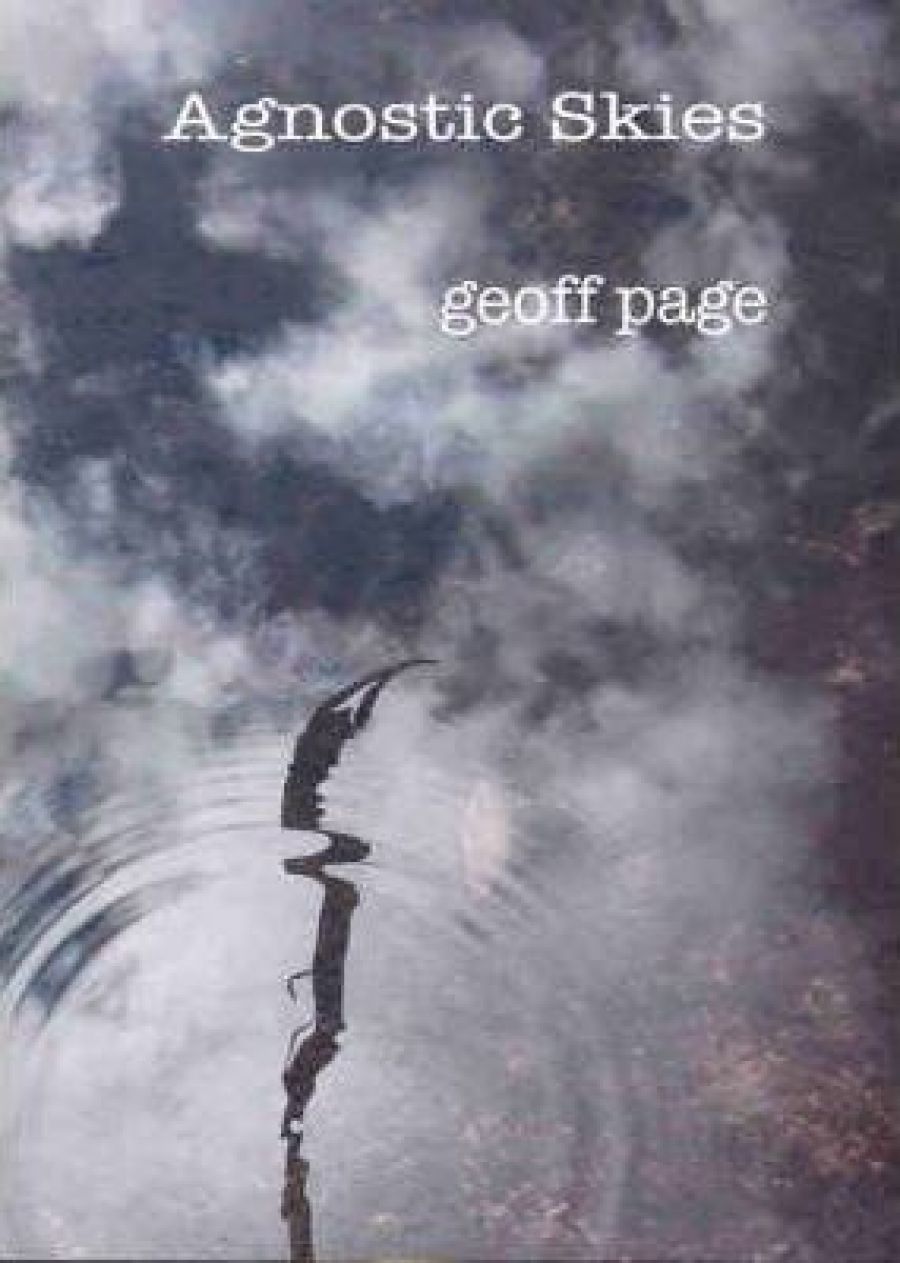
- Free Article: No
- Contents Category: Poetry
- Review Article: Yes
- Online Only: No
- Custom Highlight Text:
Geoff Page’s latest poetry collection is a wide-ranging survey of some of the issues affecting contemporary Australian life. Underpinning Page’s poems of cafés, apartments, classical music, outback murders and domestic violence is a meditation on approaching mortality and the very idea of belief. In Page’s previous collection, Darker and Lighter (2001), the troubling nature of belief was hinted at in ‘Credo’: ‘The dark-night-of-the-soul-agnostic / prefers the right to doubt. / The world’s too much beset by those / who know what they’re about.’ Five years later, Page’s reflections on belief and the loss thereof return like echoes from a bell. In the fine poem ‘At Tosolini’s’, Page contrasts the diners’ penchant for coffee with the sound of bells ringing at a nearby church: ‘The sound of bells in autumn air / has long since been a thing / that we can never quite believe / and yet we don’t despair.’ Page’s use of the inclusive pronoun ‘we’ assumes much, and perhaps speaks for those who no longer believe.
- Book 1 Title: Agnostic Skies
- Book 1 Biblio: Five Islands Press, $18.95 pb, 74 pp
Importantly, despair is a trait missing from the collection. While Page’s narrators grapple with various modes of belief, the collection as a whole is solidified by Page’s use of rhyme and an occasionally varied but mostly fixed metre. This should come as no surprise to Page’s admirers: his technical skills have long been apparent, and the detached tone he often employs enables him to cover a wide territory. For the most part, the poems are written in either two or three-line stanzas, often with full end-rhymes.
Several longer sequences in the collection employ Page’s playful humour and narrative strengths. Maths has never been a subject I quite believed in, but I enjoyed ‘Algebra’: ‘The way we shuffle pillowtalk / With what our x’s did / And how they’re at a flywire door / Taking back the kid.’ Page’s punning of ‘x’ throughout the eighteen stages of the poem develops into a catalogue of the quotidian and of the shadow of the past in relationships. This type of poem lends itself to aphorism, and Page’s lines are generally modest and wry. Empathy for the less fortunate is a trademark quality of Page. In ‘The Pleasures of Apartment Life’, Page’s sympathy for those suffering from ‘what the Body Corporate ensures’ becomes a parable against our contemporary denatured ways. ‘The sky is all we need to prune; / the clouds replace the trees: / A balcony is never mown; / we’re rarely on our knees.’
History (white and black), the arguments of Keith Windschuttle and the American government’s death-row prisons make for heavy subjects, and here Page demonstrates the rigours of his beliefs. ‘Threnody At Terre Haute’ is a powerful argument against the death penalty. Terre Haute, the place where Timothy McVeigh was executed, assumes an incantatory presence within the poem by Page’s refrain of the line ‘we should have left him living till’. The same applies to the narrative poem ‘Convergence’, in which a laconic moralism seeks to marry the plight of the innocent backpacker with the calculated motives of any ‘outsider’ Australian male who has ‘banged his way through institutions’. Recalling Ivan Milat and Bradley John Murdoch, the poem suggests that these killers could be anyone who stops us on the highway. The place where ‘lives collide’ becomes one more mythic place of the Australian outback.
Towards the end of the collection, several poems explore the subject of poetry and writing. As in Darker and Lighter, Page offers a ‘workshop poem’ on the traps of writing a sonnet. Rather than following a tradition of fishing-as writing-experience poems, Page explores the ‘ollies’, ‘kickflips’, ‘carves’ and ‘grinds’ of skateboarding. While ‘Vers Libre’ is harnessed by the regularity of its three-line stanzas, the lines possess an energy and zing ‘of “going on your nerve”, / as Frank O’Hara, New York mystic, / memorably said’.
Page’s sarcastic reference to O’Hara comes as no surprise, and his suspicion of the relaxed, elliptical line is followed up in the poem ‘I Think I Could Turn Awhile’, where he parodies the rhetoric of Whitman, Kerouac and those poetry self-promoters whose ‘pronouns are huger than Texas’. In the second sequence of the poem, Page, using a tighter foot, admits ‘That rhetoric is / someone else’s / it works with very different vowels / I’d hear the clipped / iambics calling, / my template just / below the line’. Despite the beliefs beneath the poem, I enjoyed Page’s excursion into those longer lines and the inclusion of a personal voice that was not as objective as in some of his other poems.
The collection concludes with poems that examine the role of religious persecution under our ‘wide agnostic skies’. The best of these, ‘Down With Beauty! Long Live Death!’, employs full end-rhymes to create a type of patriotic chant that deplores some of the misgivings of Islam and Catholicism while ‘The Stalinists, the Taliban’ shows the ease of Page’s style: ‘The certain like their sonnets neat. / And need your screams to be complete.’ Agnostic Skies is certainly a collection for these sceptical times.


Comments powered by CComment